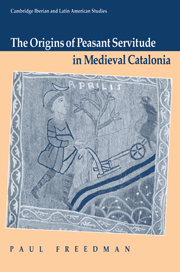Book contents
- Frontmatter
- Contents
- List of tables
- Preface
- List of abbreviations
- Map 1 Densities of Remença households at the end of the Civil War
- Map 2 Catalan comarcas and principal towns
- Map 3 Pyrenees and pre-Pyrenees
- 1 Introduction: medieval serfdom and Catalonia
- 2 Enduring characteristics of rural Catalonia
- 3 The free peasants of the ninth to eleventh centuries
- 4 Changes in the status of peasants: late twelfth and early thirteenth centuries
- 5 Catalan servitude in the thirteenth century
- 6 Effects of the Black Death
- 7 Peasant agitation and civil war, 1388–1486
- Conclusion: origins of Catalan servitude
- Appendix 1
- Appendix 2
- Appendix 3
- Appendix 4
- Bibliography
- Index
4 - Changes in the status of peasants: late twelfth and early thirteenth centuries
Published online by Cambridge University Press: 06 January 2010
- Frontmatter
- Contents
- List of tables
- Preface
- List of abbreviations
- Map 1 Densities of Remença households at the end of the Civil War
- Map 2 Catalan comarcas and principal towns
- Map 3 Pyrenees and pre-Pyrenees
- 1 Introduction: medieval serfdom and Catalonia
- 2 Enduring characteristics of rural Catalonia
- 3 The free peasants of the ninth to eleventh centuries
- 4 Changes in the status of peasants: late twelfth and early thirteenth centuries
- 5 Catalan servitude in the thirteenth century
- 6 Effects of the Black Death
- 7 Peasant agitation and civil war, 1388–1486
- Conclusion: origins of Catalan servitude
- Appendix 1
- Appendix 2
- Appendix 3
- Appendix 4
- Bibliography
- Index
Summary
The period under consideration in this section, centering on the year 1200, saw the most clear-cut change in the social condition of the peasantry. An already established tendency to define a category of peasants as subordinate to powerful lords accelerated. Personal commendation now became a routinized practice. The requirement of redemption fines to change lordship was extended to cover a substantial number of households. The bad customs came not merely to represent incidents of individual tenures but to serve as legal emblems of servile status.
All these developments involve questions of liberty and personal status. These are abstractions, to be sure, but not “mere” constructs or purely formal matters. Payment of bad customs, redemption, or acknowledgment of subjugation affected the lives and opinions of peasants. In a society such as that of Catalonia, with a strong tradition of public authority, there is a crucial difference between instability or erratic oppression on the one hand, and an entrenched aristocratic right over tenants deemed to be beyond the guarantees of customary rights. The latter is a recognized and legally defensible lordship; the former, no matter how prevalent, is banditry and its victims can at least hope for if not expect its repression by the public authority. Legitimating the exercise of aristocratic power took place during the late twelfth and early thirteenth centuries as laws tended to sanction oppressive private lordship. An opposition was established between an immune or privileged peasantry and a subalternate group expelled from the free community.
- Type
- Chapter
- Information
- The Origins of Peasant Servitude in Medieval Catalonia , pp. 89 - 118Publisher: Cambridge University PressPrint publication year: 1991

